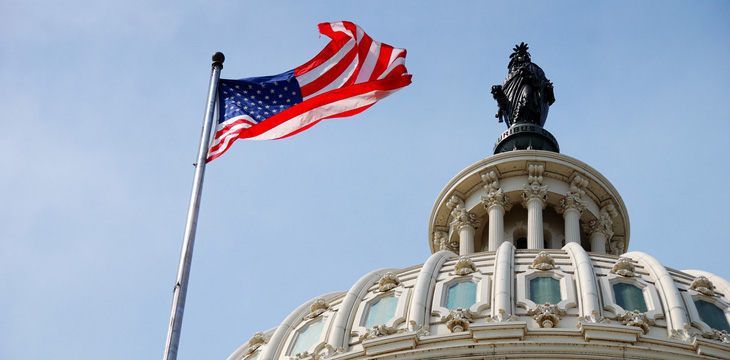|
Getting your Trinity Audio player ready...
|
Six executives representing digital currency companies were summoned to the U.S. Congress on December 8 to testify in front of the House Financial Services Committee for the hearing on “Digital Assets and the Future of Finance: Understanding the challenges and benefits of financial innovation in the USA,” which ran for a little under five hours. When the hearing came to an end, it was clear that lawmakers have a positive outlook on the digital asset industry as well as its future and they want to see it grow, although they have a few concerns about the sector that they are looking to fix via regulation.
US Congress questions and concerns
The six witnesses were Sam Bankman-Fried, CEO and founder of FTX exchange; Jeremy Allaire, CEO of Circle; Brian Brooks, CEO of Bitfury Group; Charles Cascarilla, CEO of Paxos Trust Company; Denelle Dixon, CEO and Executive Director of Stellar Development Foundation; and Alesia Jeanne Haas, Chief Financial Officer of Coinbase Global Inc.
For many of the lawmakers, the goal was to get a better understanding of the blockchain and digital asset industry, what regulations already apply to it, and what areas of the industry need more regulatory frameworks or clarity.
Most of the questions and concerns that lawmakers had fall under one or more of the following areas:
Stablecoins: Congress had many questions on stablecoins, what they were, what the proper definition for a stablecoin is, if the stablecoins offered by the two witnesses Allaire (USDC) and Cascarilla (PAX) had a product that was 100% backed by cash or cash equivalents, and if stablecoins—or really all of digital currencies—were a threat to the U.S. dollar.
Threatening the U.S. financial system: Some members of the committee were concerned about digialt currencies’ ability to threaten the U.S. financial system. When financial services can be offered directly from one peer (or group of peers) to another, the demand for traditional banks and financial intermediaries diminishes. At a large enough scale—or with the widespread use and adoption of peer-to-peer platforms—this could significantly alter the world of traditional banking and finance and as a result, it could have a major negative impact on the U.S. financial system.
Benefits of blockchain: Lawmakers wondered how peer-to-peer blockchain-based technologies could get more people included in the financial system, especially those that are unbanked or in historically impoverished underbanked demographics.
Market manipulation and abuse: It is well known that cryptocurrency markets and exchanges are susceptible to wash-trading and price manipulation. Congress asked many questions about what would help prevent or mitigate wash trading and similar abuse of the cryptocurrency markets.
Who is the government overseer: Both lawmakers and the digital currency executives discussed who has the high-level jurisdiction over what sections of the digital currency market. What plays a big role in deciding which agency has jurisdiction is defining what digital currencies are and aren’t, and what they can and can’t do—this helps lawmakers put different digital currencies and blockchain networks with different functions into their own unique buckets.
Keeping innovation in the United States: Every congressman and woman wanted innovation to take place in the United States and not overseas. Congress asked the witnesses many questions regarding how they can make sure innovation happens on U.S. soil so that businesses do not leave the country for jurisdictions with laws and regulations that are friendlier than the U.S. legal frameworks.
A digital currency-friendly future in the US
Ultimately, the lawmakers were not looking to ban blockchain and digital currencies from the U.S. or stifle innovation related to both industries. Instead, lawmakers wanted to make sure that they had a proper understanding of both sectors so that they could have educated and well-informed discussions in regard to reviewing and establishing legal frameworks for the industry.
Legislators want blockchain and digital currency to exist and thrive, and they are very interested in the United States being the epicenter for the emerging industry. But they also want to make sure that United States citizens, residents, and investors are well-protected in the markets that many call the wild west.
To make that a reality, lawmakers are going to need to enforce policy, create policy, and clarify existing policies to make sure U.S.-based companies have the proper licenses and registrations to operate while still having the space and ability to grow.
Lawmakers recognize that blockchain-based technologies can introduce more benefits than drawbacks, they know that the blockchain and digital asset industries are here to stay, and they recognize that at this point in time, their job is to become as educated as they can in regard to blockchain and digital currency so that they have the best tools and resources available to write and pass laws.
Watch: Blockchain Intelligence Group’s William Callahan CoinGeek New York presentation, FYI: Better Information Tools for a More Lawful Blockchain Industry

 02-28-2026
02-28-2026 




